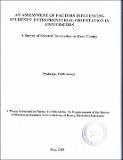| dc.description.abstract | Entrepreneurial Orientation (EO) differs from entrepreneurship which refers to the content of new venture - what is undertaken. Entrepreneurial Orientation is defined as the individuals' propensity to engage in innovative, proactive and risk taking behavior to start new venture. The following dimensions of EO were identified: autonomy, Innovativeness, proactiveness, risk-taking, and competitive aggressiveness. The set of explanatory variables for EO needs to be extended with country specific effects and cultural related variable. The study used the theory of planned behavior and Shapero's model to explain entrepreneurial orientation of the student as used in other studies. The question of concern in this study was; does the Kenyan education system promote entrepreneurial orientations specifically among the University students? The aim of this study therefore was to assess factors affecting students' entrepreneurial orientation in institutions of higher learning. A survey was conducted in selected institutions of higher learning in Meru County, namely Kenya Methodist University, Meru University of Science and Technology, and Nazarene University. The population of the study was composed of third and fourth year students both in the undergraduate programs. The study selected 300 samples using purposive sampling technique. Using descriptive research design, the researcher administered a questionnaire to each of the 300 selected respondents. The questions addressed the research objectives. Responses were coded and categorized in order to facilitate statistical analysis. Logistic regression was used to examine factors influencing entrepreneurial orientation of the students. More so, in order to determine how students differ in their entrepreneurial orientations, the chi square model was employed. The findings of the study are expected to contribute to the understanding of whether, and if so, how education can affect students' attitudes toward entrepreneurship and their entrepreneurial self-efficacy. Findings highlight the impact of education and practical exposure to entrepreneurship on entrepreneurial orientation. | en_US |

